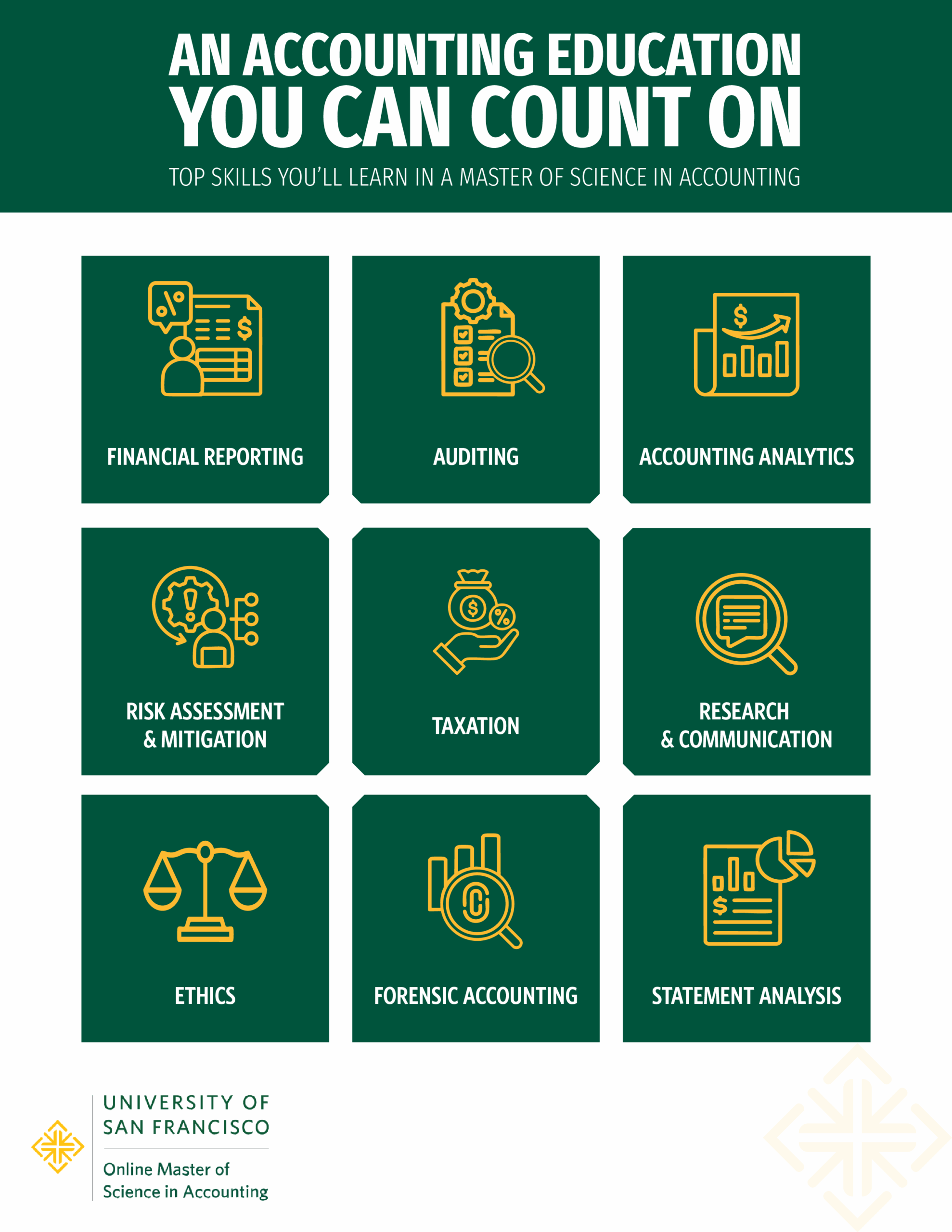
The U.S. hiring market is placing more value on graduate education every year, making it all the more appealing to start your master’s degree now. But, earning a master’s degree is a serious investment of your time and money, so how do you know if it’s worth it?
For professionals working in the accounting industry, a Master of Science in Accounting is a specialized degree option that can support your career development in a variety of ways. Notably, a master’s in accounting will expand your skill set and position you to earn your CPA designation, which in turn supports your career opportunities and earning potential.
How Can I Benefit From a Master’s in Accounting?
Increased Earning Potential
A master’s degree provides students with advanced skills, supports better critical thinking and problem solving, and demonstrates a commitment to excellence. Because of this, employers are willing to offer master’s degree holders more competitive salaries.
MS in Accounting graduates can expect an even greater impact on their earning potential. Lightcast, a labor market data analytics platform, notes that roles requiring an MS in Accounting degree advertise a median salary of $107,000.
For individuals specifically seeking to become Certified Public Accountants, both education and experience make an impact. CPAs can expect a starting salary of around $78,000, with that number climbing to $150,000 on average over the course of a 20-year career.
Expanded Career Opportunities
Earning a master’s degree also widens the scope of which jobs you can land. Master’s in accounting grads may find that they’re qualified for higher level accounting roles that leverage advanced knowledge and training. In addition to adding value to your résumé, these high-level roles offer an increase in pay and more responsibilities.
Here’s a comparison between some of the roles you can get with a bachelor’s in accounting vs. a master’s in accounting:
| Bachelor’s-Level Role | Median Annual Salary | Master’s-Level Role | Median Annual Salary |
|---|---|---|---|
| Internal Auditor | $91,900 | Forensic Accountant | $107,300 |
| Budget Analyst | $83,300 | Financial Analyst, Investment Analyst | $90,000 |
| Associate/Staff Accountant | $73,100 | Senior/Lead Accountant, Certified Public Accountant | $103,000 |
| Payroll Clerk | $48,800 | Accounting Manager | $120,000 |
Source: Lightcast
Eligibility for CPA Certification
Many individuals outside of the accounting field that the Certified Public Accountants and accountants do the same job, or they may think that all accountants are CPAs. Us in the accounting field understand that there is a difference.
If you’re interested in earning your CPA credential so that you can conduct audits and represent clients before the IRS, you will need to complete 150 credit hours of education and pass an examination. Most bachelor’s degrees are only 120 credit hours, so a master’s degree in accounting will help you meet the education hours requirement*.
Becoming a CPA comes with fantastic benefits, even if you’re not interested in auditing or client representation. Because CPAs have more specialized skills, legal authority, and education, organizations often pay them higher salaries. CPAs also have even further expanded job opportunities — both in the U.S. and internationally — working their way up to titles like CFO or tax advisor.
*In addition to the 150 credit hour requirement, most states also mandate a specific number of credit hours in areas such as accounting and business. Depending on your undergraduate degree, you may need to take additional courses to fulfill your state’s CPA eligibility requirements.

Advanced Accounting Skills & Expertise
Enhancing your expertise is a game-changing benefit of graduate accounting education. Without an advanced degree, it can take decades of on-the-job experience to become an expert in highly technical areas such as financial analysis, auditing, and taxation. In a master’s degree, however, you can learn these skills in as little as two years.
In addition to specific accounting skills, an MS in Accounting’s curriculum will also support your development in important areas like:
- Financial reporting
- Risk assessment
- Strategic decision-making
- Taxation
Strengthening your understanding of these vital skills advances both your own expertise and knowledge, while also expanding your capabilities in the workplace. Your skills won’t be relevant exclusively to traditional accounting roles, you’ll also be prepared to work in settings like corporate finance, public accounting, and consulting.
What Is the Demand & Job Outlook for Accountants?
Industry demands and market trends are always shifting, but one thing that never changes is that organizations need strong accounting experts in order to operate. The U.S. Bureau of Labor Statistics projects 5% growth for accountants and auditors through 2034, which is 2 percent faster than the average for all occupations. This growth rate equates to about 131,000 new job openings for accountants and auditors each year.
Total applications to accounting programs increased by 19 percent in 2024, the largest growth of any graduate management education area.
Specialized skills within the accounting field are also in increasingly high demand, increasing the demand for accountants with a master’s degree even further. To gain the skills that employers want — such as forensic accounting, data analytics, and regulatory compliance — a master’s degree is a great choice.
How Much Can I Expect to Earn With a Master’s in Accounting?
For most individuals who are considering graduate education, the biggest question is “Will I see a return on my investment?” While no two graduates will have the exact same outcomes, you can be confident that if you work hard and are dedicated to your career, you will see a positive outcome after earning an MS in Accounting.
The U.S. Bureau of Labor Statistics reports that all master’s degree holders earned a median salary of $90,324 in 2023, which is much higher than the average salary of those with a bachelor’s alone.
For MS in Accounting grads specifically, outcomes are even more positive. Research.com reports that professionals with a master’s in accounting earn a median annual salary of $122,000. This means that if a graduate is earning around the average salary and they choose a program with a reasonable tuition rate, they will earn back the cost of their investment in less than five years.
What Should I Choose: MSA vs. MBA?
Many individuals looking to advance their careers in management, business, finance, or accounting will weigh an MBA against a more specialized master’s degree like an MS in Accounting. Which path you decide to take can depend on several factors, most notably your career goals.
-
MBA programs provide a broad education, with a focus in management, so that mid-career professionals can advance to high-level leadership roles. MBA graduates are qualified for many different roles, with titles like:
- Management consultant
- Operations analyst
- Business development director
-
MS in Accounting programs are specialized degrees, designed to produce highly competent accounting professionals. For accounting professionals looking to advance within the field, an MS in Accounting can lead to roles such as:
- Accounting manager
- Tax manager
- Director of accounting
Become an Accounting Leader With USF’s MS in Accounting
The University of San Francisco’s online Master of Science in Accounting equips students with the skills to thrive in today’s financial world. Our flexible part-time program combines asynchronous coursework with on-demand lectures and videos so you can become an accounting leader on your own schedule.
The curriculum offers a comprehensive set of core courses, designed to equip you with the necessary skills to excel in the areas of financial reporting, auditing, data analytics, and ethical leadership. Students benefit from the expertise of industry-leading faculty who can share both their extensive knowledge and practical experience.
USF provides our students with personalized career support, networking opportunities, and access to a global job portal, extending beyond graduation.
Learn more about the Master of Science in Accounting by downloading a brochure, or start your application today.

